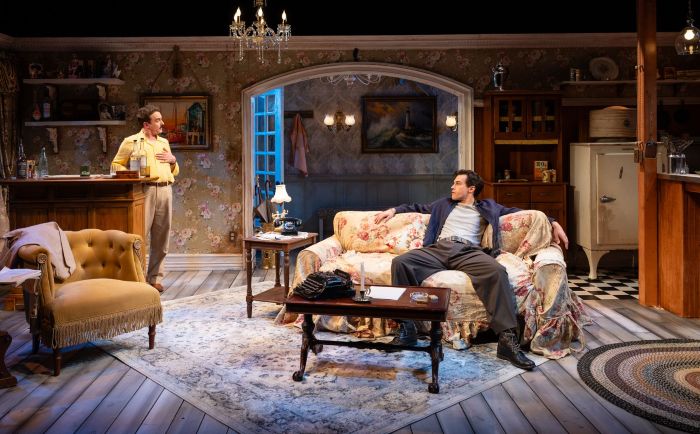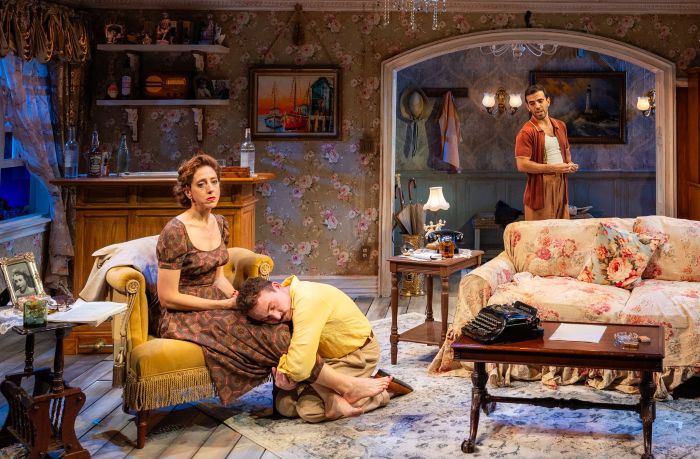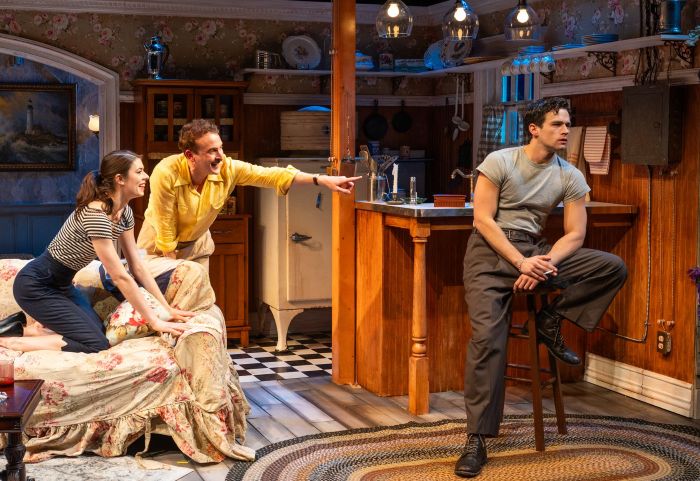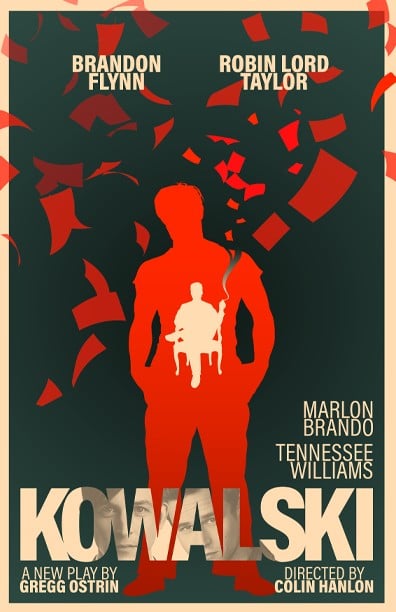In his autobiography, director Elia Kazan referenced the first meeting between the 36-year-old Tennessee Williams and the 23-year-old Marlon Brando at the former’s beach house in Provincetown, MA, on a summer night in 1947, when he arranged for the soon-to-be Pulitzer Prize-winning author to audition the young actor for the role of Stanley Kowalski in A Streetcar Named Desire. The real-life story inspired playwright Gregg Ostrin to delve into the momentous event in Kowalski, a fictionalized version of the dramatic encounter between the two legendary artists, now making its Off-Broadway debut in an already extended limited engagement at The Duke on 42nd Street.

Framed in the format of a memory play, the show opens with Williams, age 66, seated downstage and illuminated by a spotlight on the darkened set (lighting by Jeff Croiter), responding to an unheard question posed to him in a 1977 TV interview about his initial introduction to Brando. Lights up, and his recollections come to life in an imagined re-enactment of what might have transpired in the context of the factual information (provided by Kazan) combined with the familiar demeanors and personae of the two. They are assumed by Robin Lord Taylor as Williams, with the fey affectations of a Southern gentleman, and Brandon Flynn as the rough and tumble working-class Brando, who fully embraces the Stanislavski system of method acting under the influence of Stella Adler, and proves himself perfect for the part of Kowalski (leaving us to believe he intended his behavior over the entire evening to be an in-character performance).
Of course, we all know the outcome of Brando’s audition for the acclaimed stage production (and subsequent movie adaptation), but under Ostrin’s vision and the compelling direction of Colin Hanlon, sparks fly between the confrontational polar opposites from the moment he arrives (three days late), lets himself in, helps himself to food, makes himself at home, easily repairs the broken utilities in the house, and, as the drinks keep flowing, exchanges acerbic “character observations” with his host about each other, until the action freezes at a climactic point in Williams’ memories and he returns to the interview in progress, signaled by another theatrical shift in lighting.

The engaging leads are supported by a featured cast of three, whose characters’ interactions with Williams and Brando reveal the men’s tendency to use others, even those closest to them, to their own advantage, while employing their seductive skills of flattery and manipulation. Alison Cimmet turns in a top-notch portrayal of the hard-drinking director/producer Margo Jones, a close friend of “Tom” (Tennessee’s actual name), who was given the script to read, shared her glowing comments, and expected to direct the show, but was cast aside in favor of Kazan, and forgives the sweet-talking Williams anyway.
Sebastian Treviño is outspoken and impassioned as the playwright’s younger live-in lover Pancho Rodriguez, whose tempestuous nature excites and inspires the writer, and who, despite being mocked and ignored by Williams, stays in a relationship with his sugar daddy anyway. And Ellie Ricker appears as Brando’s exuberant 20-year-old (girl)friend Jo, an aspiring actress who hitchhiked with him from NYC to P’town, was left waiting for him at the bus station, then comes looking for him at the beach house, unaware that he was meeting Williams. She gushes over “Tom” as an ebullient fangirl (he lets her call him that as a “friend” though insists that Brando can’t and isn’t), serves as a pawn to incite jealousy between the two, and further enables their self-indulgent, taunting, manipulative, and combative attitudes, just as Margo and Pancho do, and like them, remains there anyway.

A period-style artistic design transports us to the time and place of the historic meeting, with the “Rancho Pancho” sign outside stage right (an authentic detail of the property, which Williams named for his lover), the setting sun and changing colors of the sky over the ocean stage left, and a central view inside the bungalow, of its prominent bar, ubiquitous drinks, and furnishings of the era, including a vintage typewriter, telephone, and radio (set by David Gallo; props by Viveca Gardner), to which the characters dance (sound by Bill Toles; movement by Nancy Renee Braun). The dress and stylings of the recognizable figures (costumes by Lisa Zinni, hair by Tommy Kurzman) likewise define them and their decade.
Kowalski offers more than an imagining of the pivotal night that resulted in the award-winning production of an American classic; it is also a penetrating psychological study of ego, power, and control, absolute dedication to one’s craft, and the drive to achieve acceptance, recognition, and success. Ostrin, Hanlon, and the cast deliver both the entertainment and the insights.
Running Time: Approximately 80 minutes, without intermission.

Kowalski plays through Sunday, February 23, 2025, at The Duke on 42nd Street, 229 West 42nd Street, NYC. For tickets (priced at $40-140, including fees), call (347) 875-7761, or go online.



